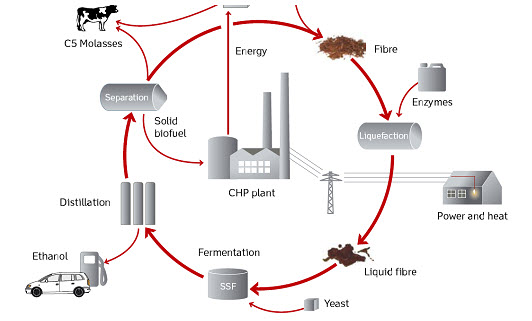Site pages
Current course
Participants
General
MODULE 1. Overview of renewable energy sources
MODULE 2. Characterization of Biomass
MODULE 3. Thermochemical conversion Technology (TCCT)
MODULE 4. Biochemical conversion Technology-Biogas...
MODULE 5. Bio-fuels (BCCT)
MODULE 6. Solar Energy Conversion System (SECS)
MODULE 7. Hydro-Energy Conversion System (HECS)
MODULE 8. Wind Energy Conversion System (WECS)
MODULE 9. Ocean Energy Conversion System (OECS)
MODULE 10. Energy conservation in agriculture
LESSON 20. Importance of biofuels
Bio-fuel is another product from biomass. In 1930 and during the Second World War, many countries converted waste agricultural products to alcohol for use in automobiles, as 10-15 per cent blends with gasoline or as entire fuel. Traditionally, alcohol for industrial use is manufactured from molasses. Grains, grapes or other fruits, vegetables such as potatoes, starchy roots like cassava, mahua, flowers and palm juice may be used depending on their value in relation to human and animal foodstuff. Biofuel such as alcohol possesses most of the desirable attributes of source of energy. It is available throughout the world from all manners of raw materials. Indeed, any organic matter may be considered as a suitable source. It may readily be produced from waste portions of crops grown for food and other purposes, such as paddy straw, sorghum stalk, molasses and saw dust, or from crops specially grown for the purpose, such as cassava.
Combat Energy Crisis
We are facing the dangers of an energy crisis due to the depletion of traditional fuel sources such as coal, petroleum, and the like. Over the past few years, there has been an increasing awareness and acceptance of bio fuels as a viable potential substitute for petroleum. With several energy-related organizations, businesses, and governing bodies starting to recognize the importance of bio-based products and bio-energy, we are likely to see more legislation in favor of these new environmentally friendly commodities.
Reduce Greenhouse Effect
Bio-fuels promise to address some of the growing concerns about our environment, particularly global warming and the harmful effect of greenhouse gases. The planet’s well-being, along with that of every individual, is at stake if we do not explore alternative paths. Changing our behavior, and thus, energy consumption to “cleaner” carbon-neutral alternative fuels like bio diesel is not just an alternative--it is essential.
Fuel Environmentally Friendly Cars
Consumers today are increasingly making “environmentally friendly” choices, including those regarding which automobiles they buy. Engines that run on bio diesel fuel or a blend of petro diesel and bio diesel are being manufactured in response to this new consciousness and desire for “green” transportation. Additionally, the automobile industry is now offering hybrid vehicles that operate on a combination of fuel and electricity. However, there is a market need for an increasing number of service stations that carry the alternative bio-fuel products and recharging if these choices are to succeed.
Break Foreign Oil Dependence
Breaking the dependence on foreign oil is another compelling reason to develop alternative energy sources. What is certain is that global energy needs, at both the industrial and personal levels, will continue to grow exponentially. Therefore, we need a sustainable, renewable option that we can depend on to continue to progress and to keep our planet alive and well.
Bio-fuels not only provide the answer to meeting our future energy needs, but respond to other societal challenges we face, as well. Such fuels offer many economic benefits and environmental.
